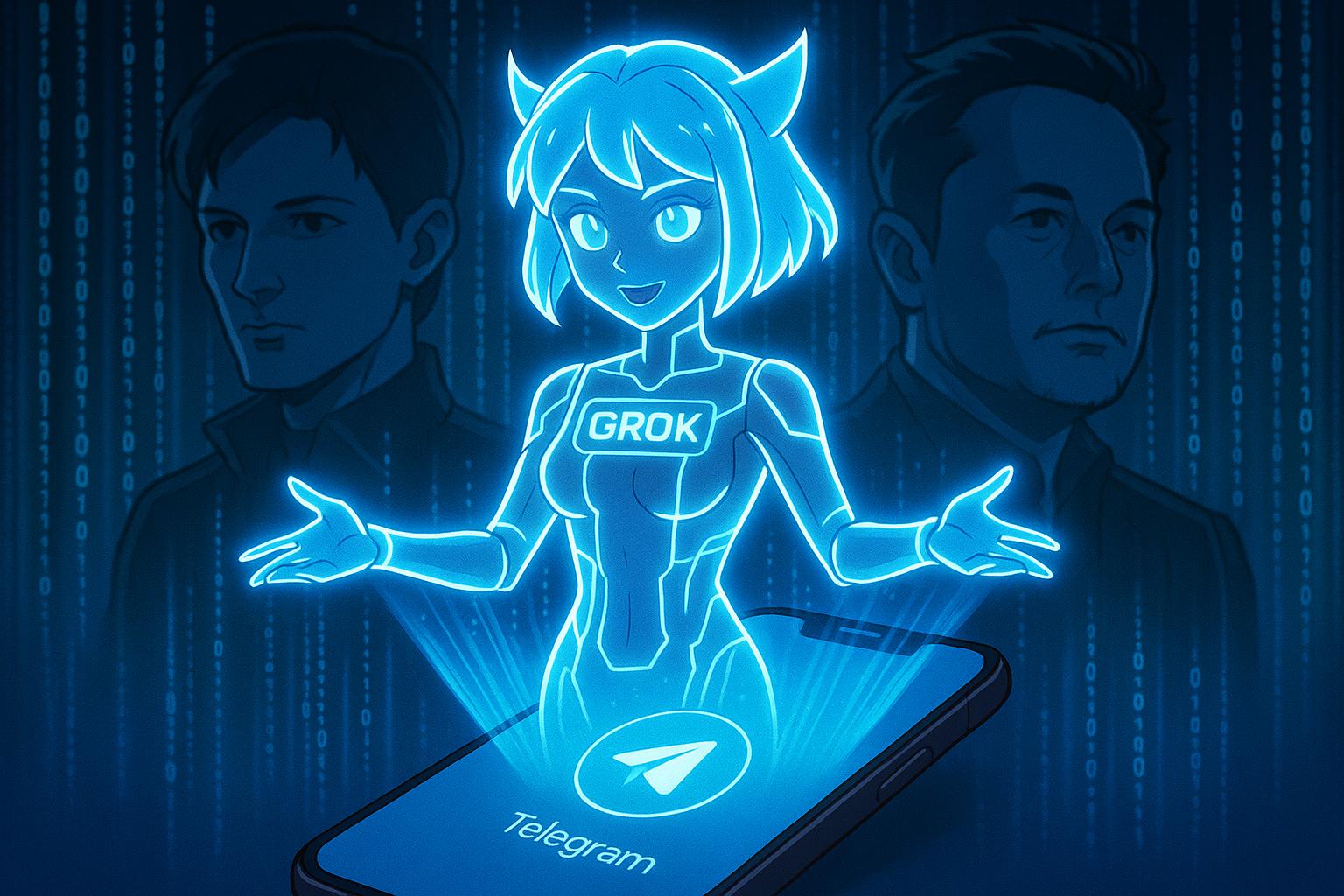Telegram has struck a $300 million deal with Elon Musk’s AI firm xAI to integrate the Grok assistant into its messaging app, aiming to boost user experience and revenue. This bold move comes as Telegram reports a dramatic profit rebound but faces scrutiny over moderation and regulatory challenges.
In a significant move aimed at enhancing user experience, Telegram has partnered with Elon Musk’s artificial intelligence company, xAI, to integrate the AI assistant Grok into its popular messaging platform. Telegram’s founder, Pavel Durov, described this partnership as a way to bring advanced AI capabilities to over one billion users, with the arrangement expected to generate $300 million in cash and equity over a one-year term, alongside a 50% share of revenue from xAI subscriptions sold through the app.
Durov’s declaration accompanying the announcement heralded a shared vision of success, stating, “Together, we win!” This collaboration adds a new dimension to Telegram’s business model as it evolves beyond messaging services. It follows other major players, notably Meta with its own AI initiatives in WhatsApp, highlighting an industry trend where social media and AI are increasingly intertwined. However, industry analysts, such as Hanna Kahlert from Midia Research, caution that this integration may not align with user expectations. Kahlert noted that “users primarily still use social platforms to talk to their friends,” suggesting that the introduction of AI might disrupt the direct communication that users value, potentially eroding trust among them.
The partnership arrives on the back of Telegram’s recent financial turnaround, with the platform reporting a profit of $540 million for 2024, a remarkable recovery from a $173 million loss the previous year. Revenue surged to $1.4 billion, driven by increased paying users and advertising revenue, as well as partnerships leveraging Telegram’s blockchain technology. The integration of Grok is expected to amplify this growth, as it will provide xAI with critical user data essential for refining its AI models, particularly during a time when high-quality data sources are dwindling.
Yet, the union of these two controversial figures—Durov and Musk—raises eyebrows. Both are known for their outspoken stances on free expression and their occasional clashes with regulatory frameworks. Durov’s recent legal troubles in France, where he was arrested amid allegations of insufficient moderation that allegedly facilitated illicit activities on Telegram, strain the image of the platform. Despite the criticism, Telegram asserts that it complies with EU regulations. Durov has claimed that he is cooperating with authorities to address these concerns, but many critics have described the platform derisively as the “dark web in your pocket.”
Elon Musk, the world’s richest man, has similarly faced scrutiny regarding his influence on technology and governance. His controversial acquisition of the social media platform X (formerly known as Twitter) has been marked by policy shifts and legal entanglements, including a substantial fine imposed for failing to curb disinformation on the site. Musk’s ambitions with xAI reflect a desire to compete with established AI leaders such as OpenAI, a company he co-founded before stepping away amid disputes over its direction. This new partnership with Telegram marks a strategic expansion of xAI’s reach, tapping into one of the world’s largest messaging user bases.
As Telegram embarks on this new venture, it stands at a crossroads, navigating the balance between technological innovation and regulatory scrutiny. While the promise of enhanced user experiences looms, the implications of integrating AI into personal communications remain to be fully realised, presenting both opportunities and challenges for the platform and its vast user community. The coming year will be pivotal for Telegram, as it seeks not only to prosper financially but also to maintain the trust of its users amidst the complexities of innovation and regulation.
Reference Map:
- Paragraph 1 – [1], [2]
- Paragraph 2 – [1], [2]
- Paragraph 3 – [2], [3], [4]
- Paragraph 4 – [5], [6], [7]
Source: Noah Wire Services
- https://www.myjoyonline.com/telegram-announces-partnership-with-musks-xai/ – Please view link – unable to able to access data
- https://www.ft.com/content/205568fa-8a99-424c-9fb3-191087adc8bd – Elon Musk’s AI company xAI has agreed to a $300 million partnership with Telegram to integrate the Grok chatbot into the messaging app, which has over one billion users. The deal includes cash, equity, and a revenue-sharing arrangement, marking xAI’s expansion beyond Musk’s X platform. This collaboration highlights the growing rapport between Musk and Telegram founder Pavel Durov, both advocates of free expression and critics of governmental censorship. The partnership follows Telegram’s reported $1.4 billion revenue and $540 million profit in 2024, driven by increased paying users and advertising.
- https://www.reuters.com/business/telegram-musks-xai-partner-distribute-grok-messaging-apps-users-2025-05-28/ – Elon Musk’s AI start-up xAI has entered into a one-year agreement with messaging platform Telegram to distribute its Grok chatbot to Telegram’s extensive user base of over one billion. Under the terms of the deal, xAI will pay Telegram $300 million in a combination of cash and stock. Additionally, Telegram will receive 50% of any subscription sales generated through the app. The collaboration is expected to significantly enhance xAI’s access to user data, which is crucial for training and improving its AI models, particularly as sources of high-quality data become scarce.
- https://www.ft.com/content/a8b42949-3d4f-4562-9f44-cc715f1494dc – Telegram reported a remarkable $540 million profit in 2024, reversing a $173 million loss from 2023. Revenues surged to $1.4 billion, up from $343 million the previous year, driven by a boost in paying users, advertising, premium subscriptions, and partnerships tied to its Ton blockchain and Toncoin cryptocurrency. Approximately half of the revenue came from the “partnerships and ecosystem” segment, including integrated mini apps for commerce and gaming. The earnings have been shared with potential investors ahead of a $1.5 billion bond offering to repurchase existing debt.
- https://www.lemonde.fr/idees/article/2024/10/10/elon-musk-pavel-durov-et-les-petits-juges_6348343_3232.html – Elon Musk and Pavel Durov, two influential figures in the digital world, have recently capitulated before regulators in democratic states following legal proceedings. In Brazil, Elon Musk, owner of X (formerly Twitter), paid a €5 million fine and blocked accounts accused of disinformation, allowing the Supreme Court to lift the suspension of X. Pavel Durov, founder of Telegram, arrested in France, began cooperating with the justice system by providing information on users violating the law, following an indictment for several offenses. These events show that digital platforms can be compelled to comply with rules, highlighting a necessary rebalancing in the application of the law, even by small judicial bodies.
- https://www.huffingtonpost.es/politica/la-fiscalia-francesa-investiga-durov-complicidad-narcotrafico-otros-delitosbr.html – The French Prosecutor’s Office has detained Pavel Durov, founder and CEO of Telegram, as part of an investigation covering a dozen charges. Among these are complicity in the dissemination of child pornography images, fraud, drug trafficking, and managing a platform for illicit transactions. The Prosecutor’s Office is also investigating Durov for refusal to cooperate with authorities and money laundering. His provisional detention was extended and could last up to 96 hours. French President Emmanuel Macron has denied that the arrest is a political decision and stated that the judicial system acts independently. Telegram has defended the platform’s compliance with EU laws.
- https://elpais.com/internacional/2024-08-24/detenido-en-francia-el-director-general-de-telegram-segun-medios-franceses.html – Telegram’s founder and CEO, Pavel Durov, was arrested in France at Le Bourget airport, near Paris. The detention, which occurred around eight in the evening, is part of a police investigation into the platform’s insufficient moderation, which authorities believe facilitates criminal activities. Durov, a billionaire residing in Dubai who refused to comply with Russian government demands to close opposition communities on his previous social network VK, has an estimated fortune of $15.5 billion and defends that Telegram, with 900 million active users, is a ‘neutral platform.’ Neither Telegram nor French authorities have commented on the arrest.













